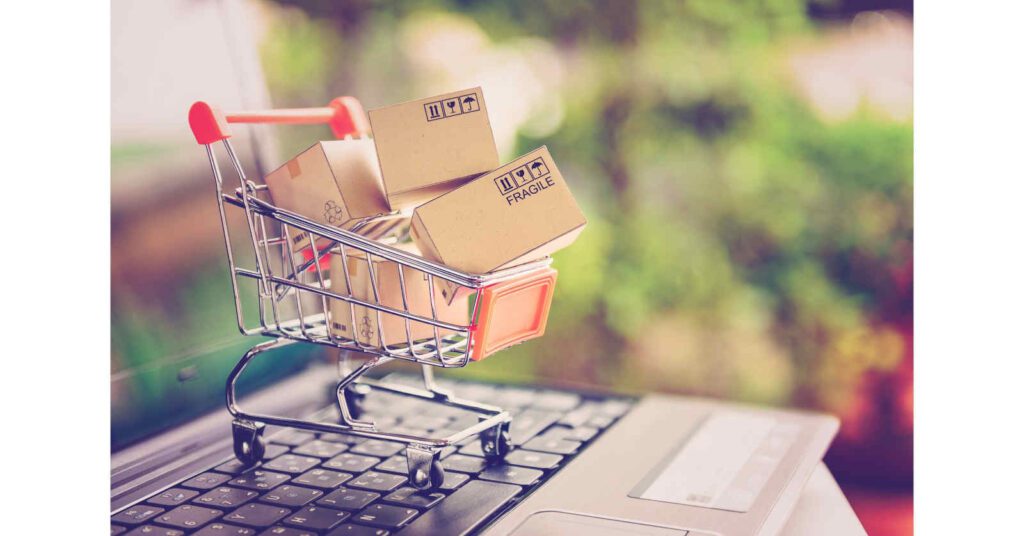
Sustainable shopping: a trend that is growing
Sustainability is the process of producing products, goods, and services in a way that meets our present needs without compromising the environment for future generations. Sustainability recognises that the environment is not an infinite resource. Therefore, it is important to use the environment and its resources with care and protect it for the benefit of the Earth, our environment and the human race.
Consumers are increasingly seeking products that are more sustainable. A recent survey by Deloitte found that 61% of consumers are cutting back on single use plastics, 49% are focusing on buying seasonal produce and 41% are trying to buy locally. In addition to this 39% of consumers are limiting the number of new products they buy, seeking out second-hand items instead. And 34% are choosing brands that have a reputation for sustainable practices.
So what is a ‘sustainable product?’ “Sustainable products are those products that provide environmental, social and economic benefits while protecting public health and environment over their whole life cycle, from the extraction of raw materials until the final disposal” [Source: Wikipedia]. So it is vital to consider the product life-cycle. One of the easiest ways to lessen environmental damage is to ensure that, where possible, the products you make use of are reusable time and again – therefore extending their life-cycle.

Why sustainability in companies is important
Sustainability and the impact we have on the environment are important topics in today’s world. Now, more than ever before, consumers are very concerned about creating waste for landfill, and recyclable materials are increasingly demanded from businesses. A recent study by Forbes showed that 88% of consumers want companies to help them make a difference by being more environmentally friendly and ethical. This is particularly true for generation Z who are focusing much more on sustainability than previous generations. So as time goes on more and more of the population will demand sustainability from organisations.
Companies should try their best to be as sustainable as possible for the following reasons:
- ‘Green’ products are becoming more mainstream. Most shoppers would prefer to purchase products and services that don’t harm the environment, with just under two-thirds (65%) of the public saying this is important.
- The public are putting their desire for sustainability into action by buying products that have green credentials. This wasn’t always the case, the intention was there but not the action.
- People are searching for environmental credentials before they buy – only a fifth of people said they never check.
- Many are happy to pay a higher price for sustainable goods – it has become acceptable to pay more for ‘green’ products.
- People will tell friends and family about sustainable purchases – More than three-quarters (78%) of respondents said they are more likely to recommend a business if they know it makes a sustained effort to be environmentally friendly.
- People will buy again from companies who make an effort with sustainability.

How companies can be sustainable
There are several steps businesses can make to function in a more sustainable way:
- Use sustainable raw materials
It’s fairly easy to source sustainable products these days, there are many options out there. Businesses can swap plastic for bamboo or make sure the plastic they use is recycled and recyclable. Encourage the recycling of your products rather than being sent to landfill. Many businesses offer environmentally friendly materials now so making the swap to them shouldn’t be difficult.
- Sustainable invoicing
Go paperless to benefit the environment and encourage your suppliers to do the same. Invoices sent by email instead of post have a lower environmental impact than wasteful paper usage.
- Send e-brochures
Swap your costly, unsustainable printed marketing material for electronic brochures or have a QR code for people to access the information. Brochures often end up being thrown away so are wasteful products. If you do have to have printed materials, use recycled paper.
- Think about transport
Swap polluting petrol vehicles to electric vans and cars where possible to have less of an environmental impact. These will not only be a more sustainable solution but will decrease fuel costs. Share car transport where possible and use public transport instead.
- Choose sustainable power
Install solar panels or heat pumps to heat office buildings rather than relying on fossil fuels which are a finite material and not good for carbon emissions. Industries need to reduce carbon emissions by 40% by 2060 to stop the planet from warming over two degrees Celsius.
- Choose reusable products
In officesmake use of reusable cloths and towels instead of paper towels. Try to reuse as much as possible. Exhibition stand contractor Quadrant2Design operate in a sustainable way by reusing their stands they hire out to companies for several years. The modular stands can be reused and reconfigured for a fresh look for different exhibitions. The products are robust and last for 15 years, so are used many times a year. They also give the option of fabric graphics instead of vinyl, and carpet tiles to customers which can be reused and are easy to recycle.
- Cut down on plastic
Plastic is not biodegradable, and it is challenging to recycle, so a lot ends up in landfill or in the oceans where it does untold damage to marine wildlife who swallow it or get caught up in it. Plastic can be replaced with cardboard or bamboo which are much more straightforward to recycle. According to a report from The New Climate Economy, 95% of plastic packaging — the equivalent of $120 billion every year — is thrown away after the first use, and microplastics have been found in 114 different aquatic species.
- Recycle
Clearly, to be sustainable you should aim to recycle as much as possible and your staff and suppliers should be encouraged to do the same.

Investment in the future
The UN recently issued The Sustainable Development Goals publishing its main aims to reach a better and more sustainable future. The report addresses the global challenges to achieving sustainability. The 17 Goals include sustainable global economic growth, zero poverty, no hunger, cleaner water and sanitation, affordable and green energy, and responsible consumption and production. These are challenging goals to reach it is hoped that they will be met by 2030. While they might be a challenge it is good to have goals for governments and businesses to work towards.
With the currnt climate crisis, there is a movement towards sustainability as a priority for businesses, as people start follow sustainable principals. Shoppers can encourage these changes by buying sustainable products which will encourage businesses to produce them. Companies need to be held accountable for all stages of production, and any damage to the environment or harmful emissions should be reduced.
We all need to play our part to lead more sustainable lives, and that includes businesses. By shopping sustainably we will encourage companies to produce sustainably. Reducing waste, harnessing the power of green energy, recycling materials and reusing as much as possible, and lowering harmful emissions can help preserve the environment for future generations.







